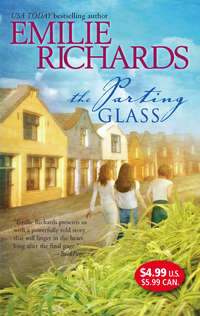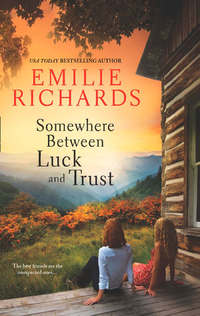
Полная версия
Somewhere Between Luck and Trust
She nodded in dismissal.
Jon was the first out of the room, and Georgia was glad to see he could still move quickly when the occasion called for it. One of her favorite teachers, Carrie Bywater, a young woman with almost no experience but loads of vitality, waited until the room emptied.
“May I walk you back to your office?”
“No problem,” Georgia said. “Something you need to talk about?”
“Someone. Dawson Nedley.”
“If we start right now we might finish before midnight.”
Carrie pushed light brown hair behind one ear. The hair was collar-length and straight, and she wore black-rimmed glasses that eclipsed the pale green of her eyes. Even Georgia, twenty-four years her senior, wore contacts and regularly had her rust-brown hair layered and shaped so it would fall naturally around her face. Carrie’s lack of interest in her appearance was a fashion statement of its own.
“He’s really a talented writer,” Carrie said. “When I can get him to turn in assignments, they’re always the best. But it’s like he’s trying to make some kind of point by not turning in most of them. I’ve done everything but beg. I’ve tried to discuss it with him. I’ve asked if he needs to talk to somebody else, like the guidance counselor. He just says he’s a simple farm boy and he doesn’t need to understand Shakespeare to toss hay bales on a truck.”
“Hay bales are a recurring theme with Dawson. He’s not a happy boy.”
“I don’t know what to do. I’m not going to let him get sucked under by something I don’t understand.”
Georgia wished all the BCAS teachers had Carrie’s attitude. She was afraid Jon hoped all his students would get sucked under in one horrific natural disaster.
Carrie was waiting for help, and Georgia made a stab at it. “Have you thought about offering him an independent study? Something he wants to do on his own?”
“Is that a good idea? He doesn’t do what he’s supposed to when he is being supervised. What would he do if he wasn’t?”
“I don’t know. If nothing else, it’s the complete opposite of what he expects. That might get him thinking.”
They had arrived at the office door. Carrie seemed to be considering Georgia’s idea. “We could set up weekly meetings to discuss his progress. I just wonder if there’s anything out there that would interest him enough to do the necessary work.”
“I guess there’s only one way to find out.”
Carrie was nodding. “I’m going to think about it.”
“You’re doing a good job. The enthusiasm shows.”
“I hope it makes up for the lack of experience. It’s too bad Jon and I can’t merge. His years and my energy. What a team.”
When Georgia entered the office, Marianne was sitting at her desk and got up to speak to her. She was sixtyish, with champagne-blond hair lacquered into a bubble, and a ready smile that gave the impression she liked her job. Marianne appreciated their small campus and limited student body.
“Edna’s been waiting about ten minutes. She said she was going to do her homework.”
Georgia had no doubt that Edna had been as good as her word. She tried not to see her granddaughter through a grandmother’s lens, but she wasn’t the only one who thought Edna was remarkable. The girl was intelligent, reliable, a natural leader. Samantha, who at Edna’s age had been surly and defiant, was doing a wonderful job of raising her only daughter, and it showed. But then the adult Samantha was a wonderful person.
Georgia alerted Marianne to a couple of items that had come out of the faculty meeting, then she headed to her own office to find her granddaughter.
Edna was sitting at Georgia’s desk, rocking back in her comfortable desk chair. She didn’t look up, too busy examining something in her hands.
Georgia stopped in the doorway. “What do you have there?”
Edna looked up and grinned. “A bracelet. It’s pretty. Is it yours?” She held it up.
“No.” Georgia thought back to her day. She’d had a handful of students in the office for one reason or another, including two girls. “Where did you find it?”
“On your desk.”
Georgia guessed one of the girls had probably lost it. Maybe the clasp had opened and it had slipped off her wrist. “Just leave it there, sweetheart. I bet the owner will come in on Monday to see if it’s here.”
“It’s got all kinds of little things on it. Animals and houses and other cool stuff.”
“They call that a charm bracelet. They were popular when I was a little girl, and I guess they still are. You buy a bracelet, then you buy or ask for charms that relate to things you do. It’s kind of a record of your life.”
Edna reluctantly set the bracelet on Georgia’s desk. “I’d like one.”
“If you’re still interested at Christmas, that might be a good thing for your Santa list.”
Edna grinned. Of course she hadn’t believed in Santa Claus since she was five, but she liked to play along.
Georgia had been at the school for too many hours, and she was ready to leave before anything else happened. “Did you do your homework?”
“I did most of it at school. I just had a little more, so I’m all finished.”
“Then let’s blow this joint.”
Edna collected her backpack and a fleece jacket she’d tossed on a chair. “Mom’s going to be at the Goddess House when we get there?”
“I have to stop by my house first, so probably. She said she’d make dinner for us.” For the first time Georgia noticed that her office had actually been cleaned. The rug looked freshly vacuumed, and her wastebasket had been emptied. Even the shelves and the uncluttered portions of her desk looked as if they had been dusted.
Apparently Tony had begun to take her seriously, which was a nice insight to take into the weekend.
“Can we stop on the way up the mountain and look at the view?” Edna asked.
Georgia put her arm around her granddaughter’s shoulders. The girl strongly resembled her mother. Same dark hair and olive skin, but green eyes instead of the golden-brown of Samantha’s, and a straight, sloping nose.
As she sometimes did, Georgia wished she knew where those green eyes had come from. Her own eyes were the color of her daughter’s. Samantha never talked about Edna’s father; his identity was the one secret she held close. But she had told Georgia that he had brown eyes, like her own.
Quite possibly the green was at least partly due to an ancestor in Georgia’s own family, but that was a secret, too, one Georgia would never have the answer to. She had no information about her parents, at least nothing she wanted to know. She’d come to terms with that years ago, but sometimes? Sometimes when she looked at Samantha and Edna, she yearned to be able to tell them exactly who they were.
Other than her beloved daughter and granddaughter.
“We’ll stop at the overlook,” she said, smoothing Edna’s wild hair back from her oval face. “Maybe we can get a good photograph or two before the sun starts to set.”
Edna gave her a quick hug, and Georgia forgot everything except how glad she was to be this child’s grandmother.
Chapter Four
WHEN SHE WAS growing up, Cristy’s father would often make her sit in a corner of the parsonage basement as punishment. While he paced back and forth in front of her, shaking his head, she would unsuccessfully squirm to find a comfortable spot on the unforgiving wooden chair. Then, just as she was certain her father had forgotten she was there, he would ask why she had done something—or sometimes, why she hadn’t. He would listen to her halting explanations, and finally hand her a sheet of paper and tell her to list everything she had done wrong, and what she had learned from the consequences.
The child Cristy had tried to cooperate, but in later years the teenager had refused. The Reverend Roger Haviland had never touched his daughter in anger, but when Cristy couldn’t or wouldn’t do what he wanted, he’d always left her there to consider her sins until bedtime. Had he ever asked what she’d learned from this “ritual,” she would have told him that after thinking about it, she had concluded that all sins were best committed after dinner.
But he had never asked.
Today, as she got out of Samantha’s car and gazed up at the old log house that was home until fate tossed her elsewhere, her father’s question sprang into her mind. Not why she had done what she had, since that was irrelevant, but what she had learned.
Standing under the shade of a massive oak tree at the bottom of a rock-crusted hillside, she realized she had carried away two things from her eight months in prison. One, that trusting anybody, no matter how nice they seemed, was foolish. And two, that there was no point in fighting for justice, because the world wasn’t a just or fair place. You were either lucky or you weren’t.
Samantha walked around the car, stretching her arms over her head. “Long trip. How are you doing?”
Cristy’s stomach was tied in a million knots. She was sorry she had eaten lunch, because even now, hours later, she wasn’t sure the hamburger was going to stay down. After lunch and shopping she had napped most of the way here, but the sleep hadn’t relaxed her.
She felt Samantha watching and met her eyes.
“I say we take a walk,” Samantha said. “Just a short one. Once everybody gets here you’ll be bombarded. My mom. Edna. Fresh air might be a good transition.”
Overhead a bird was chirping in rhythm, as if practicing feathered Morse code, but otherwise the clearing was silent. No noise from the road, no hunting dogs in pursuit of some small, terrified creature. The silence seemed to thrum with foreboding.
“It seems so...” Words eluded her. “Large,” Cristy finished at last.
“The house?”
“The outside. I could walk and walk and nothing would stop me. If I came to a fence, I could just step over it or walk around it....”
“They call that freedom. It’s going to take a little getting used to.”
“We were outside a lot in Raleigh. There were places to walk, unless you were in the segregation unit. But it wasn’t like this.”
“Yeah, we’re short on razor wire at the Goddess House. And we got rid of the guard tower last week. It messed up the view.”
Samantha was pointing out that she no longer had to worry about prison officials, but Cristy didn’t know how to respond. There was no razor wire or guard tower, but she still felt imprisoned by fear.
Samantha started along a path leading toward what looked like an old barn in the distance. “Since we had to get it last week, we put your car in the barn. Let’s take a peek, then I’ll show you around a little more.”
Cristy was afraid to venture off with Samantha and more afraid to go up to the house alone. What she could see of it looked foreboding, too, as if the long front porch sheltered glass-paned eyes that were watching and waiting for her to make a mistake. Reluctantly she fell into step.
“The house is really off by itself, isn’t it?” Cristy said.
“If you follow this path a ways you have neighbors. Bill and Zettie Johnston live maybe a quarter of a mile over the crest of the hill. Really nice folks. I’m sure you’ll meet them. By the road you’re not far from the Trust General Store, and there are people all up and down these hills. There’s even a community center down the main road a bit, what used to be the local school before they consolidated, and from what Zettie says, they schedule events there from time to time.”
Cristy realized she had better sound more confident, or Samantha might be afraid to leave her alone. “I hope that didn’t sound like I was complaining. I like silence. My little house in Berle...” Her voice trailed off.
“I’ve been there. Your employer’s daughter stored all your things in her attic, but Taylor and I—you’ll meet Taylor and her daughter, Maddie, one day soon—we drove to the flower shop to pick up some florist tools she hadn’t packed. I saw your house behind it and peeked in the windows.”
Cristy already knew that Samantha and the other woman, Taylor, had driven to Berle to pick up her belongings and car, but now she thanked her again.
Samantha hesitated. “The house where you lived has been for sale for a few months. No one’s living in it now.”
“I guess Betsy’s Bouquets will be sold, too.”
“Betsy’s daughter wants to sell, but it’s not a good time to sell anything. She sent you some things that belonged to Betsy. She said nobody else would appreciate her mother’s tools the way you would.”
Cristy was so touched that for a moment she couldn’t speak. Betsy had hired her when she dropped out of high school, and when her angry parents told her to pack her bags, Betsy had given her the little house behind the shop to live in. The arrangement had been mutually beneficial. Betsy had believed in Cristy as no one else had, and when she had suffered her first heart attack, she’d gratefully turned over much of the work to her young employee, supervising and instructing from a comfortable chair in the workroom. In turn Cristy had gotten the best possible education in floral design, as well as a roof over her head and a loyal friend.
Then, while Cristy was in the county jail waiting for trial, sixty-four-year-old Betsy had suffered her second heart attack. Cristy hadn’t been allowed to attend the funeral.
“How long did you live in the house?” Samantha asked.
“Almost five years. Betsy couldn’t afford to pay much, so the house was part of my salary. I fixed it up myself.”
“You sure did. It’s adorable.”
“Betsy didn’t care if I experimented. I tried anything I thought of. I rescued furniture from the trash and bought things at yard sales.”
“Some of us could do that and end up with a mess. I kept expecting to see an HGTV film crew come up the walkway.”
Cristy told herself to be careful. Compliments were wonderful, but that was what had brought her to this place in her life. “I won’t mind being out here,” she said. “I know how lucky I am you offered this chance.”
“We’re about an hour from Mars Hill.”
Cristy was wearing a light jacket Samantha had bought her, but the air was colder here than it was in Raleigh, crisper and more penetrating. She shivered.
“Do you want to talk about your son?” Samantha asked. “Or shall we stay away from the subject?”
Cristy found it odd to be asked her preference, but it was refreshing, too. “I guess you know Michael’s with my second cousin, Berdine Bates, and her husband, Wayne. I thought that was better than sending him to live with strangers.”
“I know you must have felt they would give him a better home than your parents could.”
“My parents didn’t want anything to do with him, or me. Not even before...” She turned her hands toward the sky. “Anyway, I wouldn’t have let them take him. They aren’t good with children. And they’re living in Ohio now. When I was arrested, the deacons told my father to start looking for a church somewhere else.”
She didn’t add that this was probably the sin her parents found most unforgivable. Not that she had shoplifted or had a child out of wedlock, but that her behavior had caused her father to be demoted to a smaller church in another state at the end of his career.
“I’m glad you found someone you trusted.”
“Berdine’s a full-time mom. They have two girls, almost teenagers now. I guess Berdine and Wayne always wanted a boy, too, but Berdine couldn’t have any more children. They’ve always been good to me. When I was growing up I spent as much time with that part of the family as I could, but not nearly enough.”
“Did Berdine contact you when she heard you’d gone to prison?”
“She sent me funny cards to cheer me up.” She didn’t add that Berdine was one of the few who had sent her anything. “She came to visit, too. Twice. She told me she would do anything she could to help me. I took her up on it.”
“So she was willing.”
Cristy had trouble with the next sentence. “When I asked, she said it would be an honor to keep my son until I was able to take care of him myself.”
“She sounds like a winner. And you like her husband?”
What wasn’t there to like about Wayne? He was a big teddy bear of a man, funny and irreverent. Cristy’s mother thought he was unforgivably rough around the edges, and her father disliked him because he didn’t take the world seriously. Those had been recommendations enough for Cristy.
She listed the important points. “Wayne hunts and fishes and works on the house when he isn’t on jobs. He has a small construction company, and he’s teaching his daughters everything he knows about building houses. He’s a man’s man who makes room for women, too.”
“I like the way you put that.”
“He’s a great dad. If Michael needs something, he won’t back down for anybody.”
“They won’t mind you visiting?”
She debated, then decided to tell the truth. “They suggested I come on Sunday, after I had a chance to rest up. In fact, they asked me to move in with them.”
“I didn’t know that. You don’t want to?”
“I’m sorry, I guess I should, but I’m not ready.”
Samantha nodded, as if she understood, but Cristy wanted to be sure she really did.
“Not ready to be Michael’s mother,” she finished.
Samantha didn’t question that, either, although it must have sounded strange. “You’ve been through a lot. You’ll be close enough here to visit him whenever you want to. This’ll be a good place for you.”
“You haven’t asked about the baby’s father.”
“You’re right.”
“Don’t you want to know?”
“Not unless you want to tell me.”
Cristy stopped walking. “My baby’s father is a man named Jackson Ford, and he’s the one who put me in prison.”
Samantha didn’t respond, so Cristy continued.
“I don’t want Jackson to see or hold or speak to Michael. Not ever. Because a man who could do what he did to me is a man who wouldn’t hesitate to hurt a child.”
“Does he know where Michael is?”
“I’m sure he does. Jackson can get anything he wants.”
Samantha didn’t try to soothe her fears. Cristy was surprised that she seemed to believe her. Instead Samantha asked, “You’re not worried about the baby’s safety?”
“Wayne will be sure Michael stays safe. He’s not a violent man, but he does believe in country justice.”
“Country justice?”
“You live outside town, the law’s not there to take care of you or make sure things are fair or right. Out in the country people take care of themselves, and they don’t put up with a lot.”
“Then Wayne’s watching for trouble?”
Cristy told Samantha one of the few things in life she was still convinced was true. “Wayne Bates will never let trouble sneak up on him. And because he won’t, he and Berdine have my son.”
* * *
Georgia knew that her daughter disapproved of fast food and didn’t feed it to Edna, at least not very often. Samantha knew her mother would respect that decision, so on the rare occasions when she didn’t, neither of them made a big deal out of it.
Which was why a happy Edna was just finishing a chocolate shake and a small order of fries as they finished the climb up Doggett Mountain to the Goddess House.
Between sips Edna was delving into philosophy. “How can something that makes me feel so good be bad for me?”
“That’s a question you’ll ask yourself a million times in the next ten years, kiddo. Just remember that something that makes you feel good in the short-term might be a problem in the long-term. That’s why you have to think things through.”
“Like I could gain too much weight or my cholesterol could go up, only worse.”
“Exactly.”
“I wonder if taking the diamond ring made Cristy feel good until they put her in jail.”
Georgia and Edna had already talked about Cristy Haviland. Samantha had told her daughter the facts—that Cristy had been caught shoplifting a very valuable ring. She had served time in prison for it, and now that she was out, she needed a place to stay.
“I think, in that case, justice was pretty swift. I think your mom said she was caught outside in the parking lot. So I doubt she had any time to enjoy what she’d done. In fact, I imagine the moment she did it, she was terrified somebody would catch her.”
“But why didn’t she figure out ahead of time that she was going to get caught? It seems pretty obvious, doesn’t it?”
“I don’t know. Does it?”
“A ring’s not like a pack of gum or a candy bar. If something is valuable, it’s sure to be missed immediately.”
“Then it sounds like something she did on impulse, don’t you think? Without thinking or planning?”
“Maybe it was just a mistake. Maybe she set the ring on the counter and somebody knocked it into her purse, or wherever they found it when they searched her.”
Georgia wasn’t sure whether Edna wanted to think the best of Cristy, or whether for her this was just an interesting mystery to solve.
“I imagine the authorities considered that possibility and discarded it,” she said. “They must have had a pretty good idea she did what they accused her of before they took the case to trial.”
“I don’t know.” Edna didn’t sound convinced. “I guess we’d have to know her to figure that out. I mean, I know people who always do impulsive things. Like they blurt out whatever they’re thinking, and afterward you can tell they wish they’d stayed quiet. There’s this one kid in my class who’ll take any dare, even if it’s impossible, and he’s always getting in trouble. Once he got stuck in a tree on the playground, and the custodian had to bring the longest ladder in the school to get him down.”
“Maybe that kind of behavior’s been a problem for Cristy.”
“Maybe so, but if it hasn’t? Isn’t stealing a ring when you’re sure you’ll get caught more than impulsive? Maybe it’s...what do they call it? A cry for help?”
Georgia could tell Edna wasn’t going to let go of this. She was reaching the age when the things she did or would do really mattered, and she knew it. Her mother had almost destroyed her own life at seventeen, something she candidly discussed with her daughter, and while Edna was only twelve, she was mature beyond her years. So Cristy, and what she had and hadn’t done, had made an impression on her, even though they hadn’t yet met.
“I can tell you this much,” Georgia said. “If she needs help, we’ll try to be sure she gets it.”
“Mom said she had a baby when she was in prison. I don’t know which would be worse, going to prison or having a baby you can’t keep.”
Georgia thought of her own mother, whoever she was, who hadn’t given birth to her in prison. That her mother had given birth in a hospital was one of the few things Georgia did know about the woman.
They fell into an easy silence for the rest of the trip. It was past five when the twisting road straightened and dipped, and they followed swiftly flowing Spring Creek into the township of Trust.
Township was another word for nowhere. Trust was nothing more than a spot where two roads met, where an attractive general store with a part-time restaurant had sprung from the foundation of an old one, where a covered bridge gave ammunition for jokes about the “bridge” of Madison County. Some grateful soul had built a thimble-size roadside chapel here and dedicated it to St. Jude. But other than houses nestled on gravel roads and plenty of fresh air, there wasn’t much else to the place. As they turned toward Luck, an even smaller destination, Georgia tried to imagine what it would have been like to grow up in this part of the state.
The Goddess House was located somewhere between the two townships. Theoretically it might be inside one and not the other, but nobody really cared. Analiese Wagner, who was a minister in Asheville, had decided that the house was at the crossroads, and everybody liked that, although no roads actually crossed here. But the women they hoped to help would probably be standing at very real crossroads in their own lives, so what was more fitting? Trust was vital. And luck? Well luck never hurt, either.
The road up to the house was unpaved and required second gear. Georgia took her time. Since becoming trustees of the house, the goddesses had made sure to have the approach graded twice, and she suspected that spring rain was going to necessitate another go at it soon. Luckily there were lots of people in the vicinity with big tractors and time before planting season, and none of them charged much.







